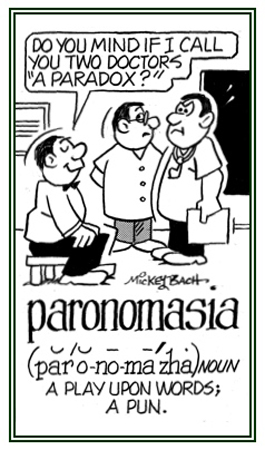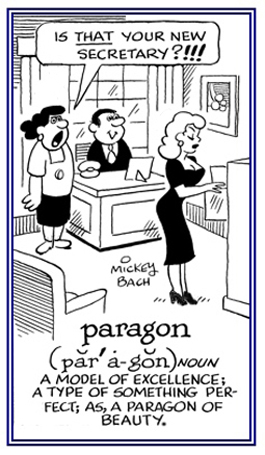para-, par-
(Greek: by the side of, beside, past, beyond; contrary, wrong, irregular, abnormal)
1. A statement or belief that is contrary to a received opinion or belief; often with the implication that it is marvellous or incredible: Sometimes a paradox has an unfavorable connotation, as being in a disagreement with what is held to be an established truth, and hence absurd or fantastic; sometimes with a favorable connotation, as a correction of some error.
2. An expression or proposition, which, on the face of it, seems self-contradictory, absurd, or at variance with common sense: After an examination or when explained, a paradox may prove to be well-founded or true.
3. A person, situation, or something that is considered, in itself, to be contradictory to reason or truth: It is a paradox when some computer programs often need special upgrading; especially, since they are supposed to exist in order to save time for users.
4. Etymology: from Latin paradoxum, "paradox, a statement seemingly absurd yet really true"; from Greek paradoxon; a noun use of the neuter of adjective paradoxos, "contrary to expectation, incredible" from para-, "contrary to" + doxa, "opinion"; from dokein, "to appear, to seem, to think".

© ALL rights are reserved.

© ALL rights are reserved.
Go to this Word A Day Revisited Index
2. An expression or proposition, which, on the face of it, seems self-contradictory, absurd, or at variance with common sense: After an examination or when explained, a paradox may prove to be well-founded or true.
3. A person, situation, or something that is considered, in itself, to be contradictory to reason or truth: It is a paradox when some computer programs often need special upgrading; especially, since they are supposed to exist in order to save time for users.
4. Etymology: from Latin paradoxum, "paradox, a statement seemingly absurd yet really true"; from Greek paradoxon; a noun use of the neuter of adjective paradoxos, "contrary to expectation, incredible" from para-, "contrary to" + doxa, "opinion"; from dokein, "to appear, to seem, to think".
The following cartoons present humorous deviations that illustrate that a paradox could be something amusing; such as, two doctors or a pair of docs.


Go to this Word A Day Revisited Index
so you can see more of Mickey Bach's cartoons.
paradoxical
1. Contrary to common opinion.
2. Apparently inconsistent with itself, or with reason, though in fact true; also, really inconsistent with reason, and so, absurd or irrational.
3. Exhibiting some contradiction with known laws or with itself; not in accordance with what is theoretically reasonable or possible; now said especially of natural phenomena that deviate from the normal or are hard to reconcile with known scientific laws.
2. Apparently inconsistent with itself, or with reason, though in fact true; also, really inconsistent with reason, and so, absurd or irrational.
3. Exhibiting some contradiction with known laws or with itself; not in accordance with what is theoretically reasonable or possible; now said especially of natural phenomena that deviate from the normal or are hard to reconcile with known scientific laws.
paradoxism
The utterance or practice of paradox.
parageusia (par uh GYOO see uh; par uh JYOO see uh)
A disordered or perverted sense of taste.
parageusic (par uh GYOO sik; par uh JYOO sik)
A reference to a disordered or perverted sense of taste; parageusis.
1. A model of excellence or perfection of a kind; a peerless example: Harry was considered by his colleagues to be a paragon of honesty.

© ALL rights are reserved.
Go to this Word A Day Revisited Index
Margaret's daughter was respected as a paragon of virtue.
2. Etymology: from Greek para-, "beside" + akone, "whetstone", hence "something sharpened against another, something made excellent in comparison with others".

Go to this Word A Day Revisited Index
so you can see more of Mickey Bach's cartoons.
paragraph
A distinct passage or section of a discourse, chapter, or book, dealing with a particular point of the subject, the words of a distinct speaker, etc., whether consisting of one sentence or of a number of sentences that are more closely connected with each other than with what stands before and after.
paragraphia
1. Loss of the power of writing from dictation, although the words are heard and comprehended.
2. Writing one word when another is intended.
3. A disorder of writing marked by the use of improper words or letters; a form of aphasia.
2. Writing one word when another is intended.
3. A disorder of writing marked by the use of improper words or letters; a form of aphasia.
paragraphism
The system or practice of composing or printing newspaper paragraphs.
parahepatic
parahepatitis
parahormone
A substance, product of ordinary metabolism, not produced for a specific purpose, that acts like a hormone in modifying the activity of some distant organ; e.g., the action of carbon dioxide on the control of breathing.
parahypnosis
1. Any kind of sleep disturbance.
2. Abnormal sleep and hypersuggestibility as in the hypnotic state, somnambulism, or pharmacologically induced general anesthesia.
2. Abnormal sleep and hypersuggestibility as in the hypnotic state, somnambulism, or pharmacologically induced general anesthesia.
parahypnotic
parakeet, parrakeet


